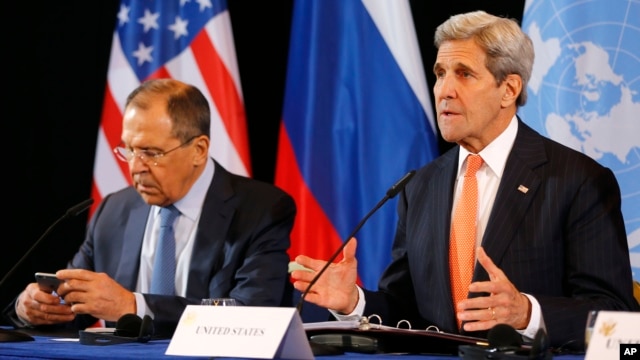Why Are Russian Engineers Working at an Islamic State-Controlled Gas Plant in Syria?
Moscow says it’s at war with the jihadist group — but both sides aren’t opposed to cutting economic deals amid the bloodshed.

FPM: Officially, Syrian President Bashar al-Assad’s government and his Russian allies are at war against the Islamic State. But a gas facility in northern Syria under the control of the jihadi group is evidence that business links between the Syrian regime and the Islamic State persist. According to Turkish officials and Syrian rebels, it is also the site of cooperation between the Islamic State and a Russian energy company with ties to President Vladimir Putin.
The Tuweinan gas facility, which is located roughly 60 miles southwest of the Islamic State’s de facto capital of Raqqa, is the largest such facility in Syria. It was built by Russian construction company Stroytransgaz, which is owned by billionaire Gennady Timchenko, a close associate of Putin. The company’s link to the Kremlin is well-documented: The U.S. Treasury Department previously sanctioned Stroytransgaz, along with the other Timchenko-owned companies, for engaging in activities “directly linked to Putin” amidst the confrontation over Ukraine.
The story of the controversial plant involves the Assad regime, Russian-Syrian businessmen, the Islamic State, and moderate Syrian groups, which together tried to activate the facility for the financial and logistical benefits it could provide for them.
The Syrian government originally awarded the contract to construct the Tuweinan facility to Stroytransgaz in 2007. The construction utilized a Syrian subcontractor, Hesco, which was owned by Russian-Syrian dual national George Haswani. Last November, the Treasury Department sanctioned Haswani for allegedly brokering oil sales between the Islamic State and the Assad regime, charges he denies.
The partnership between Hesco and Stroytransgaz goes far beyond this one deal. The companies have worked in joint projects in Sudan, Algeria, Iraq, and the UAE since 2000, according to Haswani’s son-in-law, Yusef Arbash, who runs Hesco’s Moscow office.
Construction continued slowly until a coalition of Syrian rebel groups seized the facility in a joint operation with the al Qaeda-affiliated al-Nusra Front in January 2013. Abu Khalid, a member of the Qwais al-Qarani brigade, which was a part of the rebel coalition, said that when they entered the area, Russian engineers and advisors had already fled, leaving Syrian employees behind. “We decided to protect this plant; we thought it is belonging to Syrian people since it was owned by the Syrian state,” he said.
The Islamic State has been in control of the facility since early 2014.
A senior Turkish official said that after its seizure, Stroytransgaz, through its subcontractor Hesco, continued the facility’s construction with the Islamic State’s permission.
Syrian state-run newspaper Tishreen published a report appearing to corroborate this claim. In January 2014, after the facility was captured by the Islamic State, the paper cited Syrian government sources, saying that Stroytransgaz had completed 80 percent of the project and expected to hand over the facility to the regime during the second half of the year. The article didn’t mention that the facility was under the control of the Islamic State.
According to David Butter, an associate fellow at London-based Chatham House, who has seen a letter written by George Haswani explaining the details of the project, the facility’s first phase of production started towards the end of 2014, and it became fully operational during 2015. “Some of the natural gas goes to the Aleppo power station, which operates under the Islamic State’s protection, and the remainder is pumped to Homs and Damascus,” he said.
Abu Khalid said that Russian engineers still work at the facility, and Haswani brokered a deal with the Islamic State and the regime for mutually beneficial gas production from the facility. “IS allowed the Russian company to send engineers and crew in return for a big share in the gas and extortion money,” he said, using an acronym for the Islamic State and attributing the information to Syrian rebel commanders fighting the Islamic State in the area. “Employees of the Russian company were changing their shifts via a military base in Hama governorate.”
Haswani has rejected the Treasury Department’s allegations that he worked as a middle man in oil deals between the Islamic State and the Assad regime. But he has never denied Hesco’s continued work on the gas facility after the Islamic State captured it.
The details of the Tuweinan deal brokered between the Islamic State and Hesco was first reported by the Syrian media collective Raqqa Is Being Slaughtered Silently in October 2014. The group claimed that Hesco signed an agreement with the Islamic State promising to leave a larger chunk of the profit to them. In October 2015, the Financial Times reported that the gas produced in the plant was sent to the Islamic State-held thermal power plant in Aleppo. The deal provides 50 megawatts of electricity for the regime, while the Islamic State receives 70 megawatts of electricity and 300 barrels of condensate. The engineers who worked at the plant told the Financial Times that Hesco also sends the Islamic State roughly $50,000 every month to protect its valuable equipment.
While Syria remains politically fractured, the deal at the Tuweinan gas facility shows that the rival parties are still cutting economic agreements amid the war. Aron Lund, editor of the Carnegie Endowment for International Peace’s website Syria in Crisis, said that similar gas and oil arrangements exist all over Syria. “You have them between the IS and the regime, but also between IS and rival Sunni Arab rebels, between the Kurds and the regime, Kurds and rebels, the rebels and the regime, and so on,” he said. “You have lots of informal trade connections that emerge among armed groups, smugglers, or private business to fill the gaps between the various sides as the country falls apart, while national institutions, infrastructure, and much of the economy will necessarily remain shared.”


